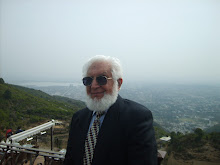The time frame is mid forties and villages of Kotla - Kakrali and other villages in that area (Gujrat, Pb. District)- mostly one or two miles apart, sort of all within walking distances
I had moved from a central India city (Saugor) and here was myfirst experience without street lights cinema houses etc. -
TheVillage life of simplicity.
There were available the followings ways of ordinary entertainments for common folks (other than wrestling and Kabaddi):
1. Song/Singers - Other than your own singing or of friends the professional singers were , for want of better words, I'll call them, Wandering Singers . There were no radio or even gramophones anywhere but some film songs would reach villages from people visiting nearby cities. Well actually the whole idea came to write this blog from my old memories -while surfing the INet the name of Alam Lohar came up. I had heard him standing close to him in a small group of listeners (may be 10-15 including children like me about 12 yr old) He was known as Äachh-Gochhia Lohar' and was famous in the villages for singing Jugni (a Common made up song along with Mahiya and such songs) as one of the folk songs His accompaniments were the çhimta'and jorri' which was customary. Chimta (a large Tongs with a round handle at one end) giving the (portable) rhythm and Jorri (two flutes producing a continuous sound/tune like that of bagpipe but without a bag)
The other well-known singer with similar accompaniments Chimta used by the singer himself and Jorri by an accompanying specialist player He was called Inayat and the name I remember because his well-known verse was
Timtim-timtim chimta kerda Jorri ghumber paya
Bahr nikal k wekkho yaro (I)nait Kotiya aya
and yes these wandering singers made their own verses also and after pleasing the crowd they may collect some coins and off they go to other villages
Other performers of song/dance were 'kanjri' sort of Kotthay wali accompanied by Tabla harmonium and this was evening/night program with adults attending ( more than 30-50) and getting more than 'coins' .
Still other were daytime singers of Na't usually in the beginning of a wa'z or some such occasion
2. Mela festival one I attended (all day during summer) near our village another village called Pindi (two with such name one was therefore Pindi Awan and other was Pindi something else) In addition to shops eatables and other things there would be an afternoon Kabaddi match or just Kushti (Wrestling) all voluntary or planned Some experienced Pehelwan/wrestler may come out and throw an open challenge for a bout in a large gathering I remember the name of a 'Rangoo' pehelwan who was sort of unbeatable in the area and such personalities were mostly Muslim or Sikkh. There would be dhole wala to play there for these gatherings Dhole tune/rhythm was kind of 'manly' for use as a victory dance called BhangRa and that is real bhangRa not what you may have heard elsewhere
Please visit my Urdu blog
There were available the followings ways of ordinary entertainments for common folks (other than wrestling and Kabaddi):
1. Song/Singers - Other than your own singing or of friends the professional singers were , for want of better words, I'll call them, Wandering Singers . There were no radio or even gramophones anywhere but some film songs would reach villages from people visiting nearby cities. Well actually the whole idea came to write this blog from my old memories -while surfing the INet the name of Alam Lohar came up. I had heard him standing close to him in a small group of listeners (may be 10-15 including children like me about 12 yr old) He was known as Äachh-Gochhia Lohar' and was famous in the villages for singing Jugni (a Common made up song along with Mahiya and such songs) as one of the folk songs His accompaniments were the çhimta'and jorri' which was customary. Chimta (a large Tongs with a round handle at one end) giving the (portable) rhythm and Jorri (two flutes producing a continuous sound/tune like that of bagpipe but without a bag)
The other well-known singer with similar accompaniments Chimta used by the singer himself and Jorri by an accompanying specialist player He was called Inayat and the name I remember because his well-known verse was
Timtim-timtim chimta kerda Jorri ghumber paya
Bahr nikal k wekkho yaro (I)nait Kotiya aya
and yes these wandering singers made their own verses also and after pleasing the crowd they may collect some coins and off they go to other villages
Other performers of song/dance were 'kanjri' sort of Kotthay wali accompanied by Tabla harmonium and this was evening/night program with adults attending ( more than 30-50) and getting more than 'coins' .
Still other were daytime singers of Na't usually in the beginning of a wa'z or some such occasion
2. Mela festival one I attended (all day during summer) near our village another village called Pindi (two with such name one was therefore Pindi Awan and other was Pindi something else) In addition to shops eatables and other things there would be an afternoon Kabaddi match or just Kushti (Wrestling) all voluntary or planned Some experienced Pehelwan/wrestler may come out and throw an open challenge for a bout in a large gathering I remember the name of a 'Rangoo' pehelwan who was sort of unbeatable in the area and such personalities were mostly Muslim or Sikkh. There would be dhole wala to play there for these gatherings Dhole tune/rhythm was kind of 'manly' for use as a victory dance called BhangRa and that is real bhangRa not what you may have heard elsewhere
Please visit my Urdu blog

No comments:
Post a Comment